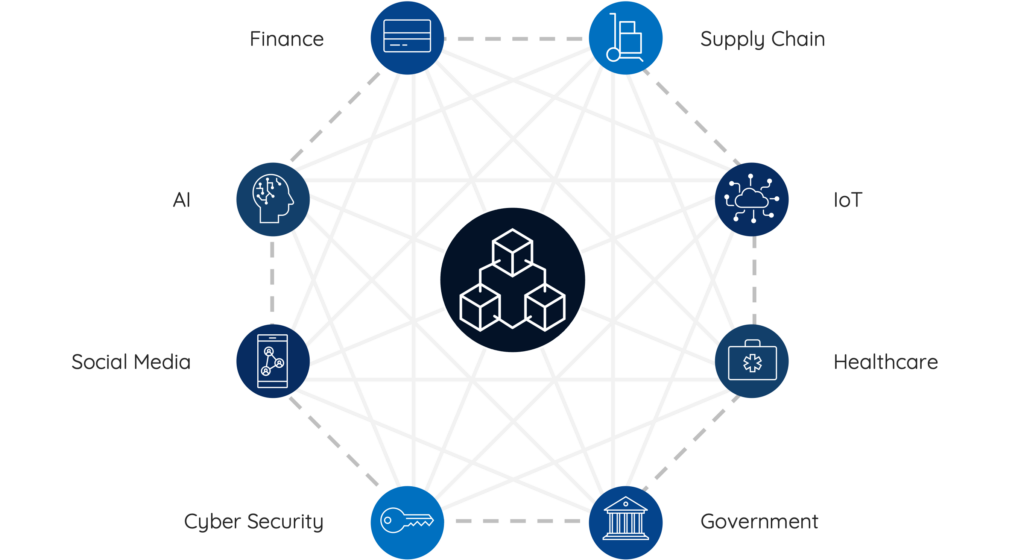Blockchain in Australia: Trends and Future Potential
In Australia, blockchain technology is rapidly becoming a significant part of the economic landscape, signaling a transformation across various industries.
Considering the technological advancements within the country, it’s essential to recognize that blockchain is more than just the foundation of cryptocurrencies.
This innovative technology is carving out a role in enhancing the transparency, security, and efficiency of transactions and is being integrated into systems ranging from finance to supply chains.
Your exploration into the Australian blockchain scene will reveal that the country is not only adopting the technology but is also at the forefront of its development.
Organizations, both government and private sector, are actively examining blockchain’s potential to innovate and optimize operations.
Moreover, the commitment of the Australian Government is evidenced through initiatives like the National Blockchain Roadmap, which aims to foster the technology’s growth and ensure Australia remains competitive on the global stage.
As you delve into Australia’s blockchain ecosystem, you’ll encounter many companies and startups pioneering this field.
The collective efforts by these entities, along with industry partners and Blockchain Australia – the peak industry network – are contributing significantly to the technology’s adoption and understanding across the nation.
This collaborative approach is positioning Australia as a hub for blockchain innovation, with the vision of capitalizing on its vast possibilities to usher in a new digital transformation era.
The Australian Government’s Blockchain Roadmap

Your government has established a National Blockchain Roadmap, reflecting a strategic move to embrace and leverage blockchain technology to boost the digital economy. Blockchain’s potential in Australia is recognized as transformative and conducive to economic growth.
Key Commitments:
- Continued Exploration: You will see ongoing efforts to uncover impactful use cases alongside industry collaboration.
- Pilot Projects: Two key pilots were launched, with up to $3 million in grant funding per pilot to reduce regulatory compliance burdens through blockchain.
Goals:
- Regulatory Framework Improvement: The Roadmap aims to streamline regulations to facilitate the technology’s adoption.
- Skills Development: Your workforce is encouraged to build expertise and capacity in blockchain technology.
- Innovation Incentives: The Roadmap promotes investment in new blockchain solutions.
- Global Leadership Ambition: The objective is to position Australia as a leader in blockchain technology on the world stage.
Projected Impact:
- Blockchain is anticipated to create significant annual business value, escalating to over $175 billion by 2025, and potentially surpassing $3 trillion by 2030.
As an Australian, you are at the forefront of an initiative that seeks to harness the benefits of blockchain, not just for its robust security and transparency features but also for the economic prosperity it promises.
Watch how these government-led strategies unfold to create a more streamlined, innovative, and globally competitive digital economy.
Blockchain Laws and Regulations in Australia

In Australia, you will find a legal environment that has been relatively welcoming to blockchain technology. The laws and regulations are shaped to foster innovation while ensuring security and compliance within the financial technology (fintech) sector.
Supportive Government Stance
- The Australian Government recognizes the potential of blockchain and actively collaborates with the industry.
- Grants and pilot programs are a part of the Government’s commitment to integrate blockchain solutions to reduce the regulatory burden on businesses.
- Significant measures have been implemented to include digital currencies under anti-money laundering laws since 2018.
Regulatory Framework
- Financial regulations: Include Know Your Customer (KYC) and Anti-Money Laundering (AML) laws.
- Privacy considerations align with the General Data Protection Regulation (GDPR), especially concerning managing Personally Identifiable Information (PII) on the blockchain.
| Aspect | Description |
|---|---|
| KYC/AML | Requirements for digital currencies |
| GDPR | Impact on data governance on blockchain |
| Innovation Support | Government grants for blockchain developments |
Compliance
As you explore the blockchain landscape in Australia, ensuring adherence to the existing legal framework is crucial. Understanding the nuances of regulations, such as the AML guidelines and how they apply to blockchain operations, is essential for your business to remain compliant and thrive within the Australian market.
Current Applications and Innovations

In exploring blockchain’s reach within Australia, you will encounter significant progress in financial technology (FinTech).
The impact is evident as blockchain technology fortifies the foundation of payment systems, revolutionizing how you transact.
It adds layers of security and efficiency to insurance policies and bolsters regulatory technologies, ensuring compliance without the cumbersome paperwork.
Notable Projects in FinTech:
- Digital Wallets: Use of blockchain-based wallets for secure and instant transactions.
- Smart Insurance Contracts: Implementation of automated, blockchain-driven contracts that streamline claims.
The Monash Blockchain Technology Centre is a beacon of innovation, promoting interdisciplinary projects that marry blockchain with real-world applications. Collaborations here are within the university’s faculties and extend to industry partnerships that yield practical, blockchain solutions.
- Energy Sector Projects: Launch of peer-to-peer energy trading platforms, reducing the distance between your energy consumption and production.
- Agriculture: Tracking of supply chains from farm to your table, ensuring food safety and sustainability.
- Public Services: Enhancement of public sector accountability through transparent operations.
By engaging with blockchain, Australia is carving pathways to a future where your daily interactions with businesses and government are more reliable and user-oriented.
Challenges and Developments
In exploring blockchain’s potential in Australia, you’ll find that challenges such as scalability, security, and regulatory compliance are pivotal.
Scalability affects how well blockchain networks can grow and handle large quantities of transactions. For security, the concern lies in protecting against breaches that not only undermine trust but can lead to substantial financial loss.
Regulatory compliance is another hurdle. With blockchain’s inherent feature of decentralization, regulatory frameworks can be tricky to navigate. This is especially so given the technology’s rapid evolution outpacing current laws and guidelines.
Additionally, it would be best to consider environmental impacts, particularly from energy-intensive operations like mining for cryptocurrencies.
To overcome these obstacles, Australia is seeing both technological and strategic advancements:
- Interoperability Enhancements: Efforts are underway to ensure that disparate blockchain systems work seamlessly together, increasing efficiency.
- Improved Data Privacy and Security: Protocols are being refined to bolster the defense against unauthorized access and to respect privacy concerns.
| Development Focus | Goal |
|---|---|
| Scalability Solutions | Expand capabilities to process transactions more efficiently at a larger scale. |
| Security Protocols | Implement advanced measures to protect against cyber threats and ensure data integrity. |
| Regulatory Innovations | Collaborate with policymakers to create informed and adaptive regulatory frameworks. |
| Environmental Mitigation | Develop less energy-intensive consensus mechanisms and blockchain systems. |
Through initiatives such as government-backed pilots and industry collaboration, these advancements aim to solidify blockchain’s role in driving innovation while addressing pressing issues.
With grants and strategic partnerships, there’s continuous movement towards a more blockchain-integrated future.
Economic and Social Impact
Blockchain technology is set to transform the Australian economy and society in several key areas. One crucial aspect is job creation.
As the blockchain industry expands, new roles in development, analysis, and compliance are expected to emerge. A report by the Australian Computer Society highlights the potential for this technology to drive the creation of new industries and jobs.
Moreover, blockchain enhances transparency in transactions and operations. By providing an immutable ledger, it allows you to verify the authenticity of transactions without relying on third parties.
This capability is particularly beneficial for supply chains, where you, as a consumer or business partner, can trace the source and handling of products with unprecedented precision.
In terms of efficiency, blockchain has the potential to streamline business processes, reducing the time and cost associated with traditional methods.
It is particularly noted for its ability to remove redundancies, automate processes through smart contracts, and reduce the risk of fraud.
These improvements are not just theoretical; research funded by the Australian Research Council has produced scalable blockchain systems that showcase these efficiencies in action.
- Job Creation: Development, compliance, new industries
- Enhanced Transparency: An immutable ledger, traceable supply chains
- Business Efficiency: Streamlined processes, lower costs, reduced fraud risk
These economic and social impacts have positioned Australia at the forefront of blockchain adoption and regulation, acknowledging this technology’s significant role in shaping the future.
Future of Blockchain in Australia
Blockchain technology, initially the backbone of cryptocurrencies like Bitcoin, is poised to impact the Australian economy significantly beyond digital currencies.
Your understanding of blockchain’s capabilities must evolve as its potential to drive innovation becomes apparent.
The Australian Government is investing in this future, facilitating the integration of blockchain technology into various sectors.
For instance, you can expect advancements in business processes that prioritize increased transparency and efficiency. Blockchain 2030 explores this trajectory, indicating a commitment to nurturing blockchain’s growth and its industry’s workforce.
While the government’s Blockchain Roadmap shines a spotlight on regulatory compliance simplification, it’s vital to understand that their approach involves considerable investment and pilot projects.
These efforts aim to yield blockchain-based solutions, featuring up to $3 million in grant funding for each initiative.
Anticipate seeing a rise in blockchain applications across diverse fields, such as finance, where industry bodies endorse it. These organizations bolster blockchain’s potential for financial freedom and transformative impacts.
- Current Initiatives:
- Government pilots to integrate blockchain into regulatory processes
- Commitment to long-term industry growth and workforce development
- Projected Impacts:
- Enhanced transparency and efficiency in business operations
- Creation of new jobs and industries through blockchain adoption
Keep an eye out for strategic alliances between the government and industry leaders, as these collaborations will be vital to unlocking blockchain’s full potential in Australia.
As you navigate the coming years, your participation in this evolving landscape could be both an opportunity and a venue for innovation.
Frequently Asked Questions
In navigating the blockchain landscape in Australia, you may have questions about regulatory frameworks, industry applications, and support from the Australian government. The information below provides clarity to these common inquiries.
What are the regulatory frameworks for blockchain in Australia?
Australia has shown a proactive stance in regulating blockchain technology.
Your compliance needs to align with the grant funding requirements for blockchain pilots, overseen by Federal Budget allocations.
The government explicitly supports legal compliance in the blockchain domain through initiatives, as CryptoLaw illustrates, which aims at helping businesses mitigate risks within the Australian blockchain ecosystem.
Which industries in Australia are benefiting the most from blockchain technology?
Blockchain technology in Australia has seen rapid adoption across multiple sectors. Industries like finance, supply chain management, and agriculture are experiencing transformative benefits from blockchain implementation.
These leapfrogs in technology enable Australian companies to enhance their operations’ transparency, security, and efficiency.
How does the Australian government support blockchain innovation?
Your opportunities for blockchain innovation in Australia are supported through strategic pilots and funding schemes.
The Australian Government Department of Industry, Science, Energy, and Resources has initiated a Blockchain Roadmap, which outlines the support and partnership programs designed to foster the use of blockchain technology in regulatory compliance and business processes.
Grants of up to $3 million for pilot projects testify to the government’s commitment to nurturing this technological advance.
Conclusion
Blockchain technology has significantly impacted numerous sectors within Australia.
In regulatory compliance, your business may benefit from blockchain-based solutions to ease the burden. A notable government initiative included providing grants to develop blockchain systems to aid businesses.
The technology’s versatility promises more than just financial transactions. You’ve seen applications ranging from improving business processes to enhancing transparency and security.
This adaptability opens opportunities for job creation and industry growth within your nation.
You are witnessing the beginning of what could be a transformative period for Australia’s digital landscape.
While the full potential of blockchain remains to be seen, its trajectory suggests a future where your transactions and data handling could be revolutionarily streamlined and secured.
The investments made today are paving the way for this future, with every sector poised to benefit from the technology’s adoption potentially.
I look forward to a progressive blockchain integration in Australia, knowing it promises to harness innovations that could shape your industries for the better.







